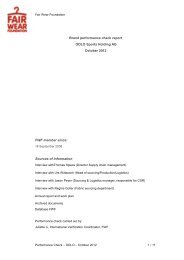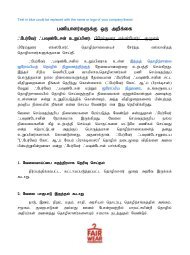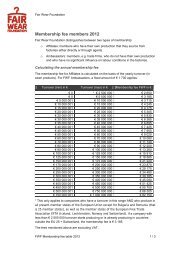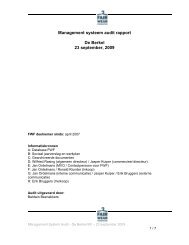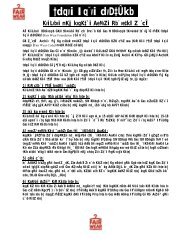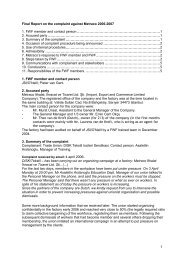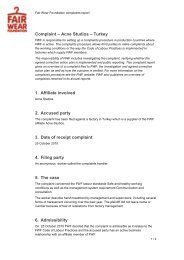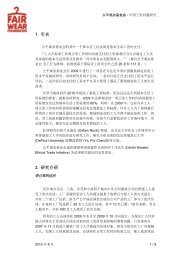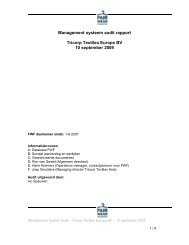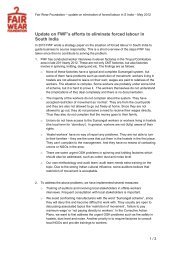Background Study Tirupur - Fair Wear Foundation
Background Study Tirupur - Fair Wear Foundation
Background Study Tirupur - Fair Wear Foundation
You also want an ePaper? Increase the reach of your titles
YUMPU automatically turns print PDFs into web optimized ePapers that Google loves.
her employer to do any arduous nature or which involves long hours of<br />
ing, or in which in any way is likely to interfere with her pregnancy or the normal<br />
development of foetus, or is likely to cause her miscarriage or otherwise<br />
to adversely affect her health. This is applicable during the period of one<br />
month before the period of six weeks before the expected delivery and one<br />
month after the six weeks after the date of delivery.<br />
• No women shall be entitled to maternity benefits unless she has actually worked in an<br />
establishment from which she claims maternity benefits for a period not less than eighty<br />
days in the twelve months immediately preceding the date of her expected delivery.<br />
• Every women entitled to the payment of maternity benefit under this Act, not with standing<br />
the application of Employees State Insurance Act, 1948, to the factory or other establishment<br />
in which she is employed, continue to be so entitled until she becomes qualified<br />
to claim under section 50 of that Act.<br />
• A women dies during the period the maternity benefit shall be payable only for the days<br />
up to and including the day of her death.<br />
• Maternity benefits payments should be at the rate of the average daily wage.<br />
4.2.2. Compliance situation<br />
Discrimination in <strong>Tirupur</strong> as elsewhere in Tamil Nadu is based on class, religion, caste and<br />
gender, but as far as workplaces are concerned, such discrimination do not manifest. Wages<br />
are fixed by categories and not by sex or other ascriptive features of Indian society.<br />
In line with the general pattern in the region, age and sex differences are found within the<br />
production units, and even among staff. Women workers are mostly working as unskilled<br />
workers and approximately only small numbers of women workers are skilled workers.<br />
In <strong>Tirupur</strong> checkers, bundlers are mostly female. The most powerful workers are the tailors,<br />
predominantly man that work on piece rate. However you can demand from companies that<br />
they do not keep women for helpers for many years without any promotion. This is to be<br />
checked. Auditors may ask management if they are not able to do higher grade work.<br />
Only a few women are found in power table machines and single needle machines as tailors.<br />
On the contrary, checking is completely a woman’s job. In Bangalore for instance much more<br />
women do machine work and have also higher paid functions in the garment industry.<br />
While women are lesser among skilled, administrative, supervisory and specialist jobs, this<br />
seems to be a customary rather than a discriminatory feature.<br />
Unskilled women workers are denied training to become skilled workers and thereby denied<br />
equal opportunity to promotion.<br />
Women in the age group of above 30 years and married women workers are not preferred by<br />
the employers. This is the general trend in all these companies. Most of the women workers<br />
are not paid their Maternity benefits during their pregnancy leave and employers are not<br />
comfortable with married women with child as they are more likely to take leave on account<br />
of their child’s health etc.<br />
Most of the workers in garment industry are less than 40 years of age irrespective of their<br />
gender.<br />
4.3. No Exploitation of Child Labour<br />
4.3.1. Ratified conventions and laws<br />
The Constitution of India:<br />
• Article 24 prohibits employment of children must be given the maximum effect so as to<br />
27





